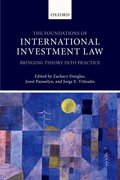Marc GALVIN
International investment law is one of the fastest growing areas of
international law. It has led to the signing of thousands of agreements, mostly
in the form of investment contracts and bilateral investment treaties. Also, in
the last two decades, there has been an exponential growth in the number of
disputes being resolved by investment arbitration tribunals. Yet the legal
principles at the basis of international investment law and arbitration remain
in a state of flux. Perhaps the best illustration of this phenomenon is the
wide disagreement among investment tribunals on some of the core concepts
underpinning the regime, such as investment, property, regulatory powers, scope
of jurisdiction, applicable law, or the interactions with other areas of
international law.
Overall, the book offers a thorough investigation of the conflicting theoretical positions underlying international investment law, testing their worth by reference to concrete issues that have arisen in the jurisprudence. It demonstrates that many of the most important practical questions arising in practice can be addressed by a carefully dosed resort to theory.
Zachary Douglas, Joost Pauwelyn, and Jorge E. Viñuales: Introduction
Part I: The place of investment law among international regimes
1: Joost Pauwelyn: Regime composition, emergence, and change
2: Ursula Kriebaum: The nature of investment disciplines
3: Martins Paparinskis: Analogies and other regimes of international law
4: Moshe Hirsh: The sociology of international investment law
5: Mark Wu: Differences in regime architecture: trade vs. investment
Part II: Conceptual foundations of investment law
6: Florian Grisel: Sources of investment law
7: Sergio Puig: No right without a remedy: foundations of investor-state arbitration
8: Thomas Schultz: The function of investment arbitration
9: Jorge E. Vinuales: Dissecting sovereignty
10: Zachary Douglas: Concepts of property
Part III: Managing regime stress within investment law
11: Anne van Aaken: Control mechanisms
12: Alex Mills: Balancing different interests
13: Julie Maupin: Differentiation
14: Jurgen Kurtz: Normative interactions
15: Stephan Schill: Harmonising substantive law
16: Michael Waibel: Coordinating adjudication processes
Zachary Douglas, Joost Pauwelyn, and Jorge E. Viñuales: Conclusions

Zachary DOUGLAS, Joost PAUWELYN, Jorge E. VINUALES (eds.), The Foundations of International Investment Law: Bringing Theory into Practice, Oxford, Oxford University Press, 2014 (592 pp.)
Edited
by:
Zachary Douglas, Associate Professor of International Law,
Graduate Institute of International and Development Studies, Geneva; barrister,
Matrix Chambers
Joost Pauwelyn, Professor of International Law and
Co-Director of the Centre for Trade and Economic Integration, Graduate
Institute of International and Development Studies, Geneva
Jorge
E. Viñuales, Harold Samuel Professor of Law and Environmental Policy,
University of Cambridge.
Contributors:
Anne van Aaken - St. Gallen University
Florian Grisel - University of Paris I
Ursula Kriebaum - University of Vienna
Jurgen Kurtz - University of Melbourne
Moshe Hirsh - Hebrew University, Israel
Julie Maupin - Duke University
Alex Mills - University College London
Martins Paparinskis - Oxford University
Sergio Puig - Stanford Law School
Stephan Schill - Max Planck Institute of Public International Law
Thomas Schultz - Graduate Institute of International and Development Studies
Michael Waibel - Cambridge University
Mark Wu - Harvard Law School
Aucun commentaire :
Enregistrer un commentaire